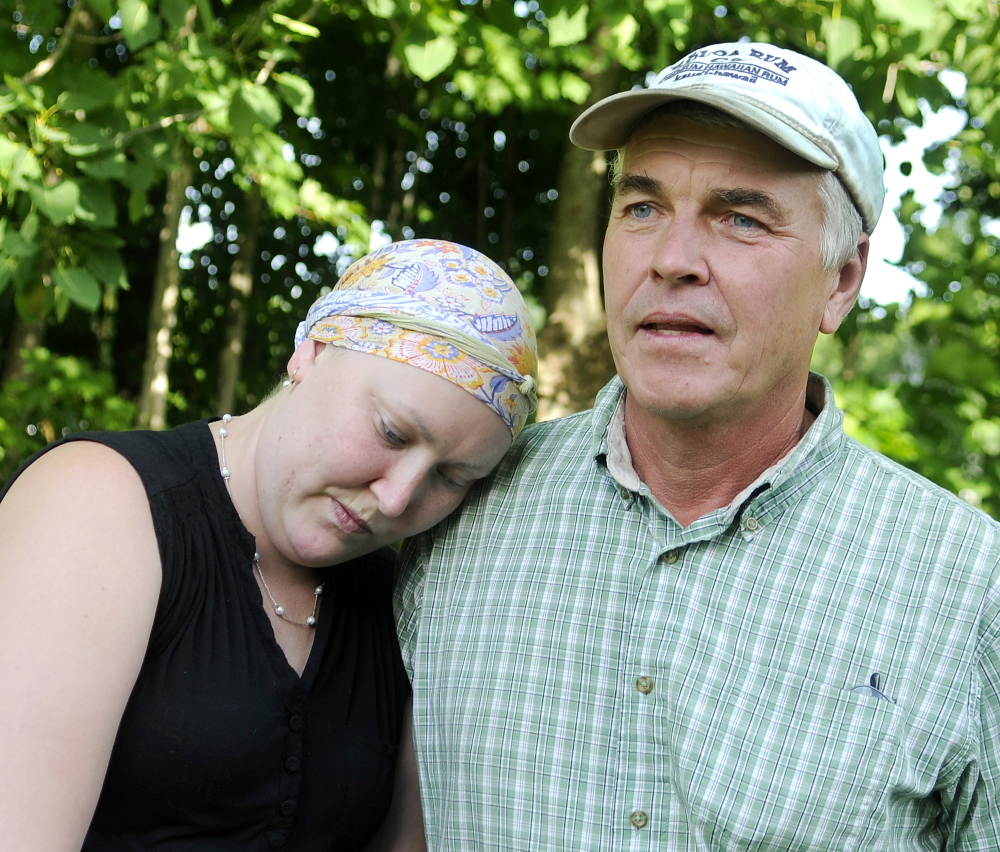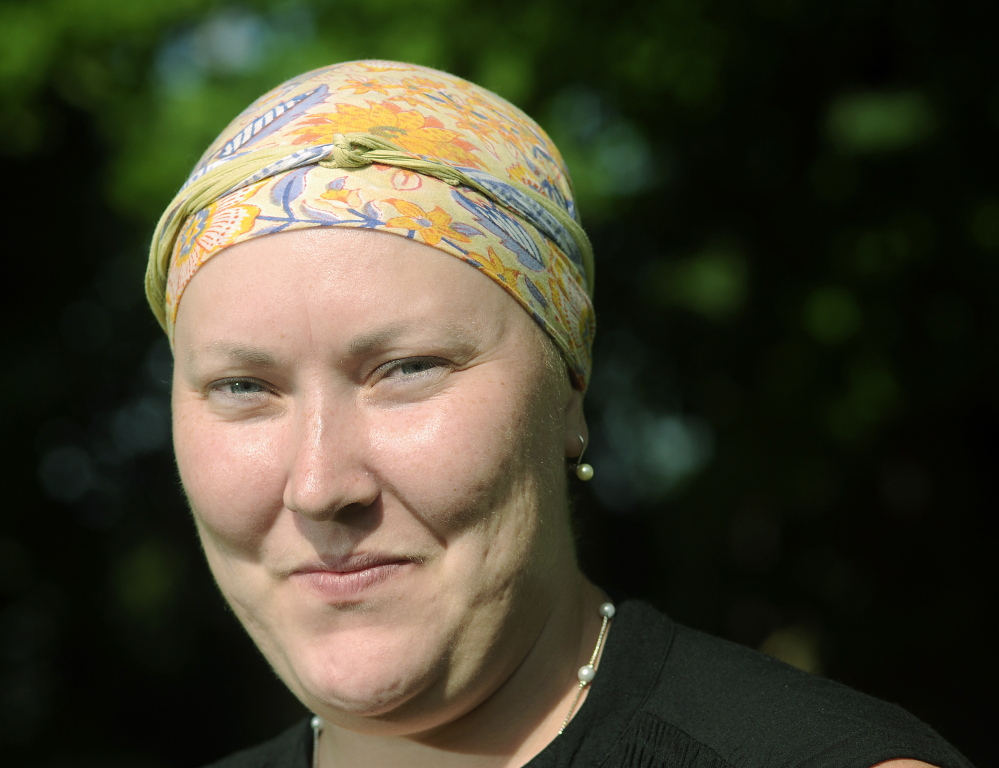WATERVILLE — It took a social media blitz and the intervention of a Boston attorney, but Heather Black is finally going to get the cancer treatment she needs.
Thursday evening, Anthem Blue Cross Blue Shield confirmed that it will cover proton beam therapy to treat Black’s breast cancer at Massachusetts General Hospital in Boston. The decision was an abrupt reversal from the company’s refusal to pay for the expensive therapy, a decision upheld by the Maine Bureau of Insurance.
The news was a welcome surprise to Heather Black, who lives in Waterville and her parents, Amy and Gregory Black, who live in Wayne.
The past few weeks have been stressful for the family, who felt as though they had hit a brick wall and were at a loss as to how to scale it.
So they went public with their frustration with Anthem.
On Wednesday, the Black family leveled a barrage of posts on Facebook and other social media that quickly were picked up by others and went viral.
Among the social media postings was one Amy Black wrote on Heather’s CaringBridge page, urging people to call the news media and spread the message.
The Morning Sentinel, after receiving a message on its Facebook page by Amy Black outlining Heather’s situation and the frustration with the insurance company, began talking to Amy and Heather Black on Wednesday morning.
Anthem on Wednesday told the newspaper it needed a waiver from Heather Black to discuss the case. Once that waiver was in hand Thursday, the insurer sent a statement saying the case was complicated and it was exploring options with the Blacks, not confirming or denying the coverage had been denied.
Late Thursday afternoon, Amy Black told the Sentinel that Anthem had reversed its decision.
It was a stunning turnaround for the family.
“We’re pretty excited,” Heather Black said in a phone interview shortly after learning about the company’s decision.
“Before, it was really shocking that they wouldn’t cover it,” she said. “Now that we fought back, it’s relieving to know that I’m going to get the treatment I need.”
The treatment, scheduled to start next week, may be Black’s final step to a clean bill of health and a chance to get back to a normal life.
In an email Thursday evening, Anthem spokesperson Rory Sheehan confirmed that the company will cover Black’s treatment.
“Ms. Black’s situation is very unique, and we have spent considerable time looking further into this case,” Sheehan said in a statement similar to what was sent before the news of the turnaround. “Proton-beam therapy of breast cancer is in the early investigational stages, is being researched around the country in clinical trials, and is not a generally accepted alternative to radiation therapy for breast cancer.
“However, due to the unique circumstances of her condition, we are working with Mass General Hospital and her physician on possible covered treatment options.”
When asked if the buzz on social media and interest from the Morning Sentinel had contributed to the company’s decision, Sheehan said, “Honestly, no, we’ve always been committed to responding to concerns from our members.”
LAWYER CONTACT
At the same time the social media blitz was going on, Amy Black was looking for a lawyer to pursue a lawsuit against Anthem.
That quest brought Mala Rafik, a Boston insurance attorney and graduate of Colby College, to the Blacks on Wednesday.
Rafik, who said she heard about the case through a colleague in Maine, contacted Anthem on Wednesday and connected the insurer with Mass General so the company could get more information about the case.
Later Thursday afternoon, Rafik told the Blacks that she had received verbal confirmation from Anthem that they would cover the procedure, Amy Black said.
Rafik said in a Thursday night email to the Sentinel that the Maine colleague referred the Blacks to her because “our firm has done health care coverage work for years.”
“I was involved in Heather’s case in an attempt to help achieve a resolution,” Rafik said. “I really can’t speculate as to why the turnaround was so fast.”
She said she doesn’t feel comfortable discussing her role or her conversations with Anthem, “but I will say that it is my belief that the facts here were clear that the treatment was medically necessary to treat Heather’s particular, very aggressive cancer.”
STUNNING NEWS
Shortly before Christmas last year, Heather Black felt a lump in her left breast. She had an ultrasound on Christmas Eve, just after signing the papers to buy a house in Waterville.
The University of Maine graduate, who works as an administrative assistant and counselor for Family Planning, wasn’t worried about the test and didn’t think it would come to anything.
But it indicated a malignant tumor.
She had a biopsy on Jan. 2, the same day she turned 24. The results that came back were scary — triple negative ductal carcinoma, grade three, a highly aggressive form of breast cancer not usually found in someone so young.
“Normally when something like this happens, people have lived their lives, and I am just beginning mine,” Black said.
“I just graduated college. I have so many things I want to do.”
She endured an eight-week round of chemotherapy, followed by a double mastectomy and breast reconstruction surgery and then eight more weeks of chemotherapy.
Although the treatments were successful, enlarged lymph nodes were found underneath her breast plate and sternum, near her heart and impossible to get at through surgery.
The alternative was traditional radiation treatment, but Heather’s doctor, Shannon MacDonald, had concerns.
Last year, scientists in Sweden and Norway published research in the New England Journal of Medicine that established a link between radiation therapy in women with breast cancer and a risk of later cardiac health problems.
That link concerned MacDonald, a specialist in radiation oncology and an associate professor at Harvard Medical School who has worked extensively with proton beam therapy, said Amy Black, Heather Black’s mother. MacDonald did not return phone calls Wednesday and Thursday requesting comment.
In conventional radiation therapy an X-ray is shot at high speeds into the body and can cause collateral damage. Protons, on the other hand, come to a stop when they hit a specific target. That limits the amount of damage to surrounding healthy tissue. Proton beam radiation is used to treat prostate, pediatric and head and neck cancers, but is still being tested for post-mastectomy breast cancer patients. Mass General has a clinical trial program for the treatment.
Considering Black’s age and how close the cancerous lymph nodes were to her heart, MacDonald was concerned that she could develop long-term cardiac problems through conventional radiation therapy, her mother said.
Black was accepted into Mass General’s clinical trial and the treatments were meant to start earlier this month.
The therapy costs more than $179,000, and $129,000 in advance is required before it can begin, Amy Black said, money the family didn’t have.
When Heather applied to Anthem for coverage, the insurer denied it.
That came as a surprise to the family — up to that point, the company had been easy to work with, said Amy Black.
DENIAL AFTER DENIAL
Anthem told the Blacks coverage was denied because there was no long-term clinical evidence to support proton beam treatment relative to post-mastectomy conventional radiation therapy.
MacDonald, however, believed Black was an ideal candidate for the therapy and had a peer-to-peer interview with one of Anthem’s doctors to lay out her case, the Blacks said. That appeal was denied.
Heather Black then filed an expedited appeal with Anthem, which was also denied.
In early July, around the time she was slated to start the proton beam therapy, Black filed an external appeal with the Maine Bureau of Insurance.
An individual has the opportunity for two internal appeals with the insurance company, and if unsatisfied with the outcome, can request an external appeal from the bureau.
An interview with a representative from IPRO, a company that reviews cases for the bureau, was held on July 10. Amy Black said the proceeding was unstructured and rushed. The bureau eventually upheld Anthem’s decision, citing a lack of information about Heather Black’s case.
Doug Dunbar, a spokesman for the bureau, wouldn’t comment on the case Thursday, saying that the bureau considers specific review cases confidential.
That left the family with three options — another appeal to the insurance company that could take 35 to 45 days to complete, filing a lawsuit in federal court to try to force the company to cover or to pay for the treatment themselves.
Heather Black said Wednesday she would not get additional radiation treatment if the options weren’t successful.
“If Anthem doesn’t approve the treatment, I think it would be too dangerous to do normal radiation, and I’d rather risk it than for sure have problems down the road,” she said.
Neither the appeal nor the lawsuit would be resolved in time for her to start her treatment. Her last chemotherapy treatment was May 29, and radiation was supposed to start no more than a month after that.
Now Black will start her proton treatment Wednesday.
“I can not tell you how stressful this has all been,” Amy Black said. “I’m just really, really excited that they’ve done this.”
Rafik, the attorney, agreed.
“I do hope that Heather’s courage and her fight to bring this issue to the forefront will be an impetus for other insurers in similar situations to approve coverage,” she said Thursday night. “She’s pretty amazing, as is her family and her community.
“It was a privilege to have had an opportunity to help.”
Peter McGuire — 861-9239
Twitter: PeteL_McGuire
Send questions/comments to the editors.





